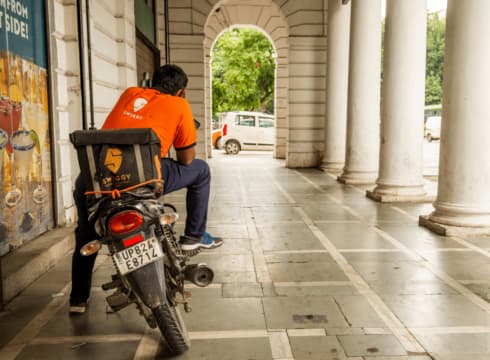Foodtech startup Swiggy has partnered with Reliance BP Mobility for the deployment of EVs in its delivery fleet and aims to cover over 8 L Kms through EV by 2025
It has also partnered with Hero Lectro Cycles and Fast Despatch Logistics for last-mile deliveries
Reliance BP Mobility will be installing battery swapping stations every few kilometres, and Swiggy will be training its delivery partners in how to use EVs, battery swapping, and apps that monitor battery performance
Inc42 Daily Brief
Stay Ahead With Daily News & Analysis on India’s Tech & Startup Economy
Online food delivery giant Swiggy has announced a partnership with Reliance BP Mobility — a joint venture of Reliance Industries and UK energy major British Petroleum (BP) — to trial electric vehicles in its delivery fleet.
Hero Motors’ electric bikes division Hero Lectro and UK-based last-mile logistics service provider Fast Despatch Logistics have also partnered with Swiggy for electric cycles. The company has announced it will cover over 8 Lakh KM via EVs by 2025.
In the partnership, Reliance BP Mobility will be building an EV ecosystem and battery swapping stations for Swiggy’s delivery partners across the country. This move is expected to lower the running cost of vehicles by 40% for Swigggy’s delivery partners and lead to higher earnings. Swiggy explored switching to electric delivery fleets with electric bikes and scooter aggregators like Zypp, Spinny, eBikeGo in 2020.
Reliance BP Mobility will install battery swapping stations every few kilometres, the company claimed. This would ensure lower wait time, and a pre-charged battery for 65 KM-80 KM coverage. Swiggy will also be training its delivery partners on how to use EVs, battery swapping, and apps that monitor battery performance.
Hero Lectro’s electric cycles are developed explicitly for last-mile delivery. They can travel at a maximum speed of 25 KMPH with a range of 70 KM-75 KM per charge. Swiggy will be using Hero’s electric cycles for last-mile deliveries. The pilot is currently live in Hyderabad and is expected to go live in other metro cities soon.
The number of electric vehicles registered for cargo in India has increased from 6,246 in 2018 to 27,645 in 2021. According to a recent report by Boston Consulting Group (BCG), India’s gig economy is all set to triple in the next three-four years and one of the biggest challenges in this regard is sustainability.
Swiggy’s biggest competitor, foodtech startup Zomato, had recently joined Climate Group’s global electric mobility initiative and plans to convert its entire delivery fleet to electric by 2030. Besides food delivery, other ecommerce platforms like Flipkart and Amazon are also working towards adding EVs to their delivery fleet.
Flipkart has been in talks with Mahindra Electric, Piaggio, Hero Electric for customised EVs and plans to have more than 25,000 EVs on the road by 2030. Its rival Amazon has also partnered with Mahindra Electric to add 10,000 EVs to its delivery line by 2025.
Shivcharan Pulugurtha, the SVP for business operations at Swiggy said, “Our association with Hero Lectro Cargo and Fast Despatch Logistics to pilot the use of EVs for food delivery reflects this (sustainability) commitment. Their affordable and purpose-built cargo bicycles will not only enable us to reduce our carbon footprint but will also help reduce the cost of delivery per kilometre for our delivery partners.”
{{#name}}{{name}}{{/name}}{{^name}}-{{/name}}
{{#description}}{{description}}...{{/description}}{{^description}}-{{/description}}
Note: We at Inc42 take our ethics very seriously. More information about it can be found here.


